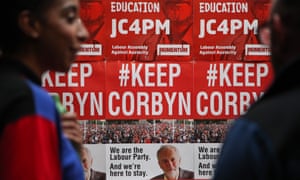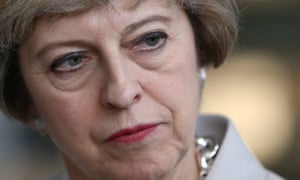
The Labour party is teetering on the edge of a precipice and could “bust apart and disappear”, the leadership challenger Owen Smith has warned.
The Labour MP, who resigned from the frontbench last month, said he did not want the party to split but this had now become likely if Jeremy Corbyn remained as leader.
He made the prediction as new YouGov research suggested support for Labourcould fall to about 20% if either the right or left of the party splinters away.
It comes the day before Corbyn and Smith have their first head-to-head encounter at a live debate in Cardiff.
Before the clash, Corbyn, who is the firm favourite to win the contest, will unveil his 10-point vision for the country, including key pledges to bring about full employment with the creation of 1m jobs powered by infrastructure investment across the UK, security at work through stronger employment rights and an NHS free of any private sector influence.
He has previously dismissed talk of any split in Labour, and his campaign chair, John McDonnell, last week accused Smith of talking up the prospect of dissent in order to boost his chances.
Smith said people were being “fatalistic” about the idea of a split and “utterly condemned” the idea of an autonomous parliamentary faction, pledging that he would never leave the Labour party.
But in an interview with the Guardian, Smith said he had warned McDonnell and Corbyn: “We are teetering on the edge of a precipice here. The party could be split. The party that has been here for 116 years as the greatest source of social and economic justice could be bust apart and disappear.”

Talk of a split within Labour has increased as MPs who do not back Corbyn increasingly fear being deselected during the forthcoming boundary review if they remain tied to the current leadership.
“There is every likelihood that the party will split if Jeremy wins this election. Some on the hard left of the party like McDonnell, and some on the right of the party, are fatalistic about that,” Smith said.
“I’m making it my mission to stop that split happening and that’s why I’m standing to be leader. Although come what may, I’m Labour to my core and will never leave. It’s the Labour party or nothing for me.”
He has repeatedly claimed that McDonnell and Corbyn are indifferent to the possibility of such a schism, alleging that the shadow chancellor said in a meeting: “If that’s what it takes.”
This is strongly disputed by the Labour leadership. In response to Smith’s latest claims, a pro-Corbyn Labour source said: “Owen Smith has now resorted to blackmail. It just shows how desperate his campaign has become and the lengths to which he’s prepared to descend to that he’s now trying scare Labour members into voting for him.
“If Owen is really opposed to a split, all he has to do is denounce the small minority of MPs backing his campaign who are calling for one. And publicly commit that he will accept the outcome of this election and serve under Jeremy. It really is that simple. Anything less shows it’s a cheap tactic from a disunity candidate.”
There is little appetite among MPs for a breakaway faction as most are determined to stick with the Labour name, but they may have little to lose if they feel they will either fail to retain their seats under Corbyn or face being ousted by their local parties in favour of pro-Corbyn candidates.
Research for YouGov published on Wednesday suggested the left would be in a very difficult electoral scenario if there was a Labour split, as it tried to model the consequences of a breakaway group. It found the Conservatives enjoyed support of about 40% regardless of whether Labour stayed intact or split.
But Labour could dip as low as 21% if led by Corbyn, while centre-left splitters standing as Social Democrats, Progress or moderates would be as low as 13%. A centre-left rump of Labour would be at 19%, while a Momentum/radical party led by Corbyn or his wing would get about 14% support.
This would be likely to lead to huge gains for the Conservatives under the first-past-the-post system and could give Ukip a foothold in the north of England if Nigel Farage’s former party elects a credible leader.
Corbyn will place a pledge for full employment throughout the UK at the heart of his vision. His first pledge will be to create 1m good quality jobs by investing £500bn in infrastructure, manufacturing and new industries, supported by a publicly owned national investment bank.

His second pledge will be to improve job security, giving people stronger employment rights immediately after they begin a new job. He will claim a Labour government would end exploitative zero-hours contract and create new collective bargaining rights. On top of this, Corbyn would put action against undercutting of pay and conditions through the exploitation of migrant labour at the centre of the Brexit negotiations.
A third pledge on the NHS will be to “end health service privatisation and bring services into a secure, publicly provided NHS”.
Earlier, Smith laid out what he says is a fully costed plan to reverse Conservative cuts to in-work benefits and give 5 million workers a real living wage. Smith described the plan as a “triple lock” to boost the living standards of low-paid workers, including a flat rate of pension tax relief, a full reversal of Tory cuts to in-work benefits, a rise in the minimum wage to the levels of the real living wage and extending it to all adults rather than just over-24s.
Questioned on how he would tackle corporate Britain, given his former job in the pharmaceuticals industry, Smith said he would want to “stick up taxes, for a start” and would be “much bolder in terms of high pay”.
“What on earth are we doing trying to get corporation tax down to 17%; that is about half the rate of most of the rest of the world. It is immoral and it is not working,” he said, adding that he would ringfence corporation tax receipts to put 4% extra into the NHS every year.
Corbyn is the strong favourite to win the contest, but some of his allies fear that up to 50,000 new members could be excluded from the ballot by the vetting process. Another 150,000 people who signed up after early January are also prevented from voting unless they paid £25 to be a supporter.
A legal challenge at the high court about whether that decision was valid is due to be heard on Thursday, as the Labour website at the time suggested all new members would be eligible to vote in the leadership contest.
